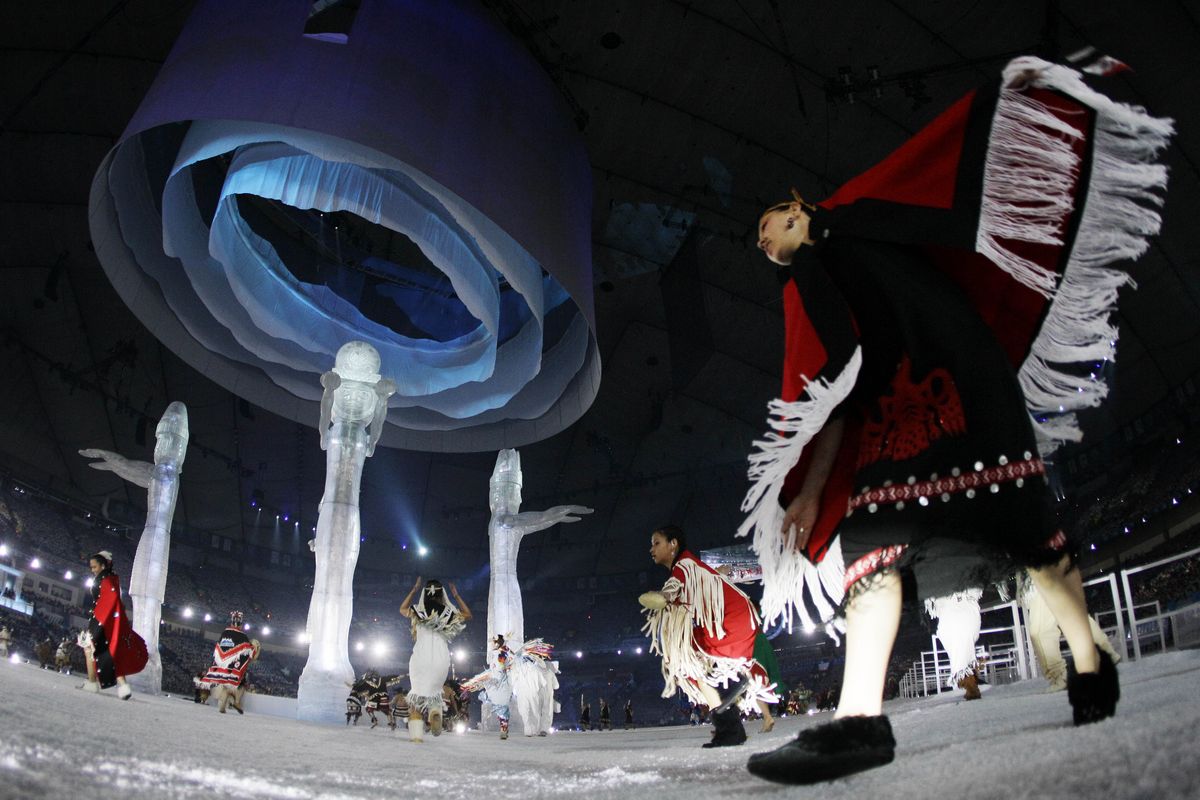Games open on bittersweet note
Indoor celebration marred by death of Georgian luger

VANCOUVER, B.C. – The show went on – with grief and a closing glitch.
The Olympics’ opening ceremonies unfolded in a mostly jubilant atmosphere, with an upbeat crowd filling BC Place Stadium only hours after a luger from the country of Georgia, Nodar Kumaritashvili, was killed in a horrific training-run crash at Whistler.
After several somber pauses during the show to pay respects to him, the much-awaited surprise ending went awry. One huge piece of the set failed to rise from the stadium floor, and left one of the four final torchbearers, speedskater Catriona LeMay Doan, unable to use her torch.
The ceremonies were dedicated to Kumaritashvili, and a moment of silence was observed in his memory. The seven remaining members of the Georgian team, who decided to stay and compete, wore black armbands as they marched behind a black-trimmed flag. Most of the crowd rose to give respectful applause.
International Olympic Committee President Jacques Rogge and the top Vancouver organizer, John Furlong, urged the athletes to compete in Kumaritashvili’s honor.
“May you carry his Olympic dream on your shoulders and compete with his spirit in your heart,” Furlong said.
More than 60,000 people packed into the stadium for the evening extravaganza, the first Olympic opening or closing ceremony ever held indoors. The loudest ovation came midway through, when the red-clad Canadian team – aiming for a first-place finish – entered the stadium as the last contingent of the parade of nations.
The climax called for the caldron to be lit jointly by four Canadian sports heroes – all-time hockey great Wayne Gretzky, skier Nancy Greene, basketball All-Star Steve Nash and LeMay Doan. But the former speedskating medalist was left to stand by awkwardly when one of the four pillars holding the Olympic caldron failed to rise.
A second, far larger caldron was lit by Gretzky in a plaza along the downtown waterfront – giving Vancouver a visible symbol for the rest of the games that the indoor stadium could not provide.
Rain was forecast through the weekend in Vancouver, with high temperatures near 50 degrees, prompting some to dub these the Spring Olympics. Rain also has disrupted Alpine skiing events at Whistler.
About 2,500 athletes from a record 82 countries are participating in the games, vying for medals in 86 events – including the newly added ski-cross competition. First-time Winter Olympic participants include the Cayman Islands, Colombia, Ghana, Montenegro, Pakistan, Peru and Serbia.
The overall favorites include Germany and the United States – which finished first and second four years ago in Turin – and also Canada, a best-ever third in 2006 and now brashly proclaiming its intention to finish atop the medals table on its home turf.
The cultural segment of the ceremony featured many of Canada’s best-known musical stars – including Bryan Adams, Nelly Furtado, Sarah McLachlan and k.d. lang.
It also highlighted performers and traditions from Canada’s aboriginal communities. And the highest-ranking official delegation at the ceremony – amid dignitaries from around the world – included the four chiefs of the First Nations, whose traditional native territory overlaps the Olympic region.
Several well-known Canadians received the honor of carrying the Olympic flag at a high-profile moment near the end of the ceremony. Among them were hockey Hall of Famer Bobby Orr, singer Anne Murray, race car driver Jacques Villeneuve and Betty Fox, mother of national hero Terry Fox.
Terry Fox lost a leg to bone cancer as a youngster, then set off in 1980 on a fundraising trek across Canada. He had to give up after covering more than 3,000 miles, and died in 1981 at age 22, but remains revered as a symbol of courage and perseverance.